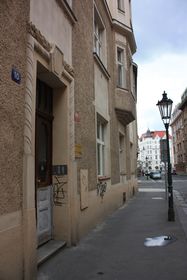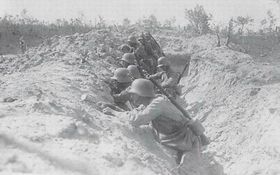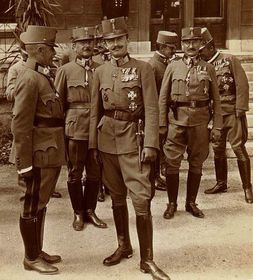Bílkova Street 10, Old Town
 In the summer of 1914 Kafka’s brother-in-low Karl Hermann was called up for military service in the war and his wife, Kafka’s sister Elli, along with her two children sought refuge in the parental apartment in the Oppelt House. Since there was not enough space for all of them, Kafka moved out of the apartment. He was able to stay for a month at his sister’s in the Bílek Street as long as she was away. He wrote here the novel The Trial. After she came back, he moved into Elli’s empty flat in the Neruda Street (today Polská). In February and March 1915 Kafka again lived in the same house in the Bílek Street, this time as the principal tenant of a small flat. His quiet was agian disturbed by the neighbor:“Both speak softly, the landlady almost audible, so much the worse. My writing which had finally picked up 2 days ago interrupted, who knows for how long. Pure desperation. Is it that way in every apartment? Is such a ridiculous and certainly deadly adversity in store for me with ever landlady in every city?”. “Everything stalled. Bad irregular budgeting of time. The apartment spoils everything for me. Listened again today to the French lesson of the landlady’s daughter.”
In the summer of 1914 Kafka’s brother-in-low Karl Hermann was called up for military service in the war and his wife, Kafka’s sister Elli, along with her two children sought refuge in the parental apartment in the Oppelt House. Since there was not enough space for all of them, Kafka moved out of the apartment. He was able to stay for a month at his sister’s in the Bílek Street as long as she was away. He wrote here the novel The Trial. After she came back, he moved into Elli’s empty flat in the Neruda Street (today Polská). In February and March 1915 Kafka again lived in the same house in the Bílek Street, this time as the principal tenant of a small flat. His quiet was agian disturbed by the neighbor:“Both speak softly, the landlady almost audible, so much the worse. My writing which had finally picked up 2 days ago interrupted, who knows for how long. Pure desperation. Is it that way in every apartment? Is such a ridiculous and certainly deadly adversity in store for me with ever landlady in every city?”. “Everything stalled. Bad irregular budgeting of time. The apartment spoils everything for me. Listened again today to the French lesson of the landlady’s daughter.”
On March 1, 1915, Kafka finally gave notice that he was moving out after “weeklong preparations and fear” and “from my own disquiet”: “I have already given notice for the room, is cost me a lot of strength of decision. Almost every morning the old woman came to my bedside and whispered to me new suggestions for improvements with which she was going to increase the quietness of the flat. With my notice that I was moving out formulated in my head, I still had to thank her. When on the penultimate day I finally opened my mouth to give her the news, she was just removing her daughter’s good theater coat from the closet (there’s a kind of yellowish theater coat with a lace collar, that makes me completely melancholy, and this was such a coat), she wanted to go out that evening to a small party with her daughter, so I didn’t want to spoil her fun and postponed giving notice to the next day. By the way, it wasn’t quite as bad as I expected, she, nevertheless, confided to me that she had been convinced that I would stay on with her until my death (as far as that point in time was concerned she did not express herself more precisely).”
 The great theme of the day in the Bilek Street was the World War, which for the Kafka-family didn’t remain without consequences. Although the store remained open all day, no clients were to be seen all day. Kafka’s brother in-law, Josef Pollak, had come back home from duty on the front lines with a hand-wound. Kafka was determined to enlist; he had even bought suitable boots for this undertaking. He feared that he would be declared unfit for service because of a heart condition, but following muster on the Schützeninsel (Archer’s Island) in early summer 1915 he was categorized as “fully fit for service” and assigned to the III Replacement Company of the k. k. Infantry Regiment No. 28. But his superiors at the AUVA thwarted his plans: Kafka, they maintained, was “indispensable and irreplaceable”. Being called up for the territorial reserve service would “cause a substantial hindrance and retardation in carrying out the re-classification of the factories, which would as a consequence produce bad will among the business owners, diminish the payment of premiums, and therefore would of necessity bring damage to the Company, thus ran the wording of the petition of June 10, 1915, handed in at the k. u. k. Military Command in Prague.
The great theme of the day in the Bilek Street was the World War, which for the Kafka-family didn’t remain without consequences. Although the store remained open all day, no clients were to be seen all day. Kafka’s brother in-law, Josef Pollak, had come back home from duty on the front lines with a hand-wound. Kafka was determined to enlist; he had even bought suitable boots for this undertaking. He feared that he would be declared unfit for service because of a heart condition, but following muster on the Schützeninsel (Archer’s Island) in early summer 1915 he was categorized as “fully fit for service” and assigned to the III Replacement Company of the k. k. Infantry Regiment No. 28. But his superiors at the AUVA thwarted his plans: Kafka, they maintained, was “indispensable and irreplaceable”. Being called up for the territorial reserve service would “cause a substantial hindrance and retardation in carrying out the re-classification of the factories, which would as a consequence produce bad will among the business owners, diminish the payment of premiums, and therefore would of necessity bring damage to the Company, thus ran the wording of the petition of June 10, 1915, handed in at the k. u. k. Military Command in Prague.
On November 6, 1915, Kafka visited a frontline trench that had been dug on the Emperor’s Island. Large numbers of citizens of Prague crowded in front of this trench to get an idea of the nature of a front-line military installation. In May 1916 Kafka still wanted to enlist but after the lung hemorrhage in 1917 there couldn’t be any further thought of that. More and more friends, family members, writer- and work colleagues were being called up for service now, life in Prague was proving to be increasingly more difficult. The asbestos factory was shut down, Hermann Kafka’s business was also having a rough time.
 From the end of October until mid-November, 1917, Austro-Hungarian troops advanced victoriously along the Tagliamento River, which the press in Prague reported on in detail. A dream about this battle on the Tagliamento Kafka recorded in his diary: “It is the Prussian guards, young quiet people, not many, perhaps just a company, all appear to be officers, at least they march past us, with short steps, slowly, close together, here and there looking at us, the matter-of-factness of this march into death is at the same time moving, uplifting and guarantees victory. Relieved at the intervention of these men I awake.”
From the end of October until mid-November, 1917, Austro-Hungarian troops advanced victoriously along the Tagliamento River, which the press in Prague reported on in detail. A dream about this battle on the Tagliamento Kafka recorded in his diary: “It is the Prussian guards, young quiet people, not many, perhaps just a company, all appear to be officers, at least they march past us, with short steps, slowly, close together, here and there looking at us, the matter-of-factness of this march into death is at the same time moving, uplifting and guarantees victory. Relieved at the intervention of these men I awake.”
Until the end Kafka sympathized with Austria and its German allies and felt “sadness at the Austrian defeats”.
